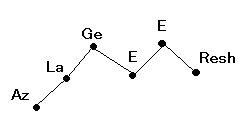Geresh (trope)
| Geresh | |||||||
|---|---|---|---|---|---|---|---|
| |||||||
| cantillation | |||||||
| Sof passuk | ׃ | paseq |
׀ | ||||
| etnakhta/atnakh | ֑ | segol |
֒ | ||||
| shalshelet | ֓ | zaqef qaton | ֔ | ||||
| zaqef gadol | ֕ | tifcha/tarkha | ֖ | ||||
rivia/ravia’ |
֗ | zarqa | ֘ | ||||
| pashta | ֙ | yetiv | ֚ | ||||
| tevir | ֛ | geresh/gerish | ֜ | ||||
geresh muqdam ] |
֝ | gershayim/shenei gerishin | ֞ | ||||
| karnei pharah | ֟ | telisha gedola/talsha | ֠ | ||||
| pazer (gadol) | ֡ | atnah hafukh ] |
֢ | ||||
| munakh/shofar holekh | ֣ | mahapakh/shofar mehupakh | ֤ | ||||
| merkha/ma’arikh | ֥ | merkha kefula/terei ta’amei | ֦ | ||||
| darga | ֧ | qadma |
֨ | ||||
| telisha qetana/tarsa | ֩ | yerah ben yomo |
֪ | ||||
| ole | ֫ | illuy | ֬ | ||||
dehi ] |
֭ | zinor | ֮ | ||||
Geresh (
Haftarah, and other books of the Hebrew Bible. It is most often found together with the Kadma
, in which case the pair is known as Kadma-V'Azla, but it can also be found independently, in which case it is referred to as Azla Geresh or simply as Geresh.
The Geresh occurs 1733 times in the Torah in the Kadma-V'Azla pair, and 1112 times separately.[1]
The Hebrew word גֵּ֜רֵשׁ translates into English as driving out.
Total occurrences
| Book | Geresh | Azla |
|---|---|---|
| Torah | 1112[1] | 1733[1] |
| Genesis | 244[1] | 427[1] |
| Exodus | 228[1] | 373[1] |
| Leviticus | 175[1] | 307[1] |
| Numbers | 223[1] | 393[1] |
| Deuteronomy | 242[1] | 413[1] |
| Nevi'im | 957[2] | 1492[2] |
| Ketuvim | 780[2] | 1240[2] |
Melody
References

